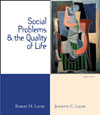 |  Social Problems and the Quality of Life, 8/e Robert H. Lauer,
U.S. International University
Jeanette C. Lauer,
U.S. International University
The Environment
Internet Exercises- Visit the Solstice: Center for Renewable Energy and Sustainable Technology
(CREST) Website. (http://solstice.crest.org/)
From the homepage, under "Documents and Databases," select "Environment."
From the index that appears, select "Global Change." In the new display,
under "A Review of Climate Change & Ozone Depletion," select "Global
Change Archives (July 1995 to Present) by Month." You will now be at "Global
Change: Electronic Edition: Archives." In the boxed table, select "2000:
JAN-MAR" (yellow background). Then on the next screen, click on "Opinions
& Commentaries." From the resulting list of articles, select "Winning
and Losing the Global Warming Debate," by Roger A. Pielke, Jr. and Daniel
Sarewitz. Read the article.
- Explain and contrast the positions of "Cassandras" and "Dorothies"
in the global climate change debate.
- Summarize the third perspective proposed by the authors.
- For a contrasting point of view on global climate change, one that Pielke
and Sarawitz might classify as of the "Cassandra" variety, access
the Greenpeace Website. (http://www.greenpeace.org/)
Explore the site to get a general sense of its perspective and resources. From
the colored strip at the bottom of the homepage, select "climate."
Look over the articles (and their topics) you find; then select "Reports."
From this new page, scroll down to "The Arctic," and select "The
western arctic, including Alaska and northwestern Canada, is warming at a rate
three to five times faster than the Earth as a whole." Read through the
"Factsheets" section and click on the link to "Polar Meltdown"
(Feb. 2000). Read what you find.
- Summarize some of the evidence for an arctic polar meltdown over the last
40 years.
- What are some of the possible implications of this arctic melting.
- Regarding the mechanisms that appear to account for arctic climate change,
explain the Arctic Oscillation Index and the effects it seems to have been having
in recent years.
|
|



 2002 McGraw-Hill Higher Education
2002 McGraw-Hill Higher Education